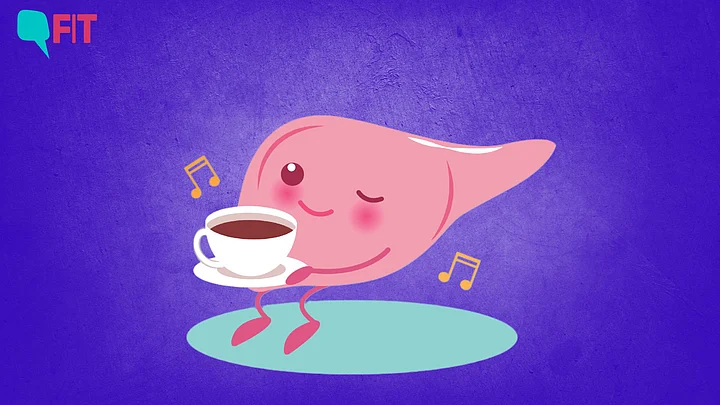Lately, coffee has been touted to have benefits not only for liver health or liver disease, but also a 'medicine' in certain cases.
Moderate coffee consumption has been shown to be associated with a reduced risk of hospitalisation and mortality from several chronic diseases of the liver, including nonalcoholic steatohepatitis (NASH), a severe form of Non-Alcoholic Fatty Liver Disease (NAFLD), and alcoholic liver disease.
Both NAFLD and alcoholic liver disease have a propensity to progress to chronic liver disease popularly known as cirrhosis of liver.
However, it isn't as straightforward as 'a cup of coffee a day keeps liver issues away'. There's more to it.
Coffee Consumption & Liver Health
A 2005 study, titled Coffee and Caffeine Consumption Reduce the Risk of Elevated Serum Alanine Aminotransferase Activity in the United States, has shown that coffee consumption may reduce this risk.
Another 2005 study, published in Oxford Academic, indicates that coffee drinkers may have a lower risk of developing liver cancer.
What may be music to coffee lovers’ ears is that the reduction of the risk of developing Cirrhosis is directly proportional to the amount of coffee consumed.
In yet another study, titled Systematic Review With Meta-Analysis: Coffee Consumption and the Risk of Cirrhosis, it has been found that two cups a day would probably reduce the odds of developing cirrhosis by 44 percent which increases to 65 percent if four cups are taken in a day.
But it is extremely important to realise that drinking coffee in excessive quantities and continuing to indulge in alcohol is not going to help matters.
The Bright Side of Coffee Consumption
The exact mechanism of the association of coffee with reduction in the risk of developing liver disease including liver cancer, is as yet poorly understood, but it is possible that coffee being rich in antioxidants may help combat the oxidative stress and inflammation in the liver caused by various injurious agents like viruses and fat deposition.
The most well-known organic chemical in coffee is caffeine. However, coffee has several other chemicals too. It is not yet known which of these metabolites of coffee are responsible for its protective action.
One of these, paraxanthine, possibly slows the growth of scar tissue which leads to fibrosis and later cirrhosis. Similarly, two other organic chemicals kahweol and cafestol in coffee, alongside the mainstream treatment may help fight liver cancer.
Another interesting observation found in a 2020 study, published in MDPI journal, is that acids in coffee may act against Hepatitis B Virus (HBV). All these benefits accrue regardless of how coffee is prepared, provided that no sugar is added.
In the coming few years, it may not come as a surprise if coffee is used as an adjuvant treatment modality for these chronic diseases of the liver.
For the present, however, enough is not known to recommend any specific amount of coffee and if coffee is more effective in certain groups of population and ineffective in others as there is individual variability in sensitivity to coffee both in terms of protective and adverse effects.
Coffee and Tea: Finding the Right Balance
It is also important to keep in mind that in the doses recommended, coffee may cause various other problems, for example:
Severe acidity
Irregularity of heart rhythm
Increase in blood pressure
These effects may be mediated through caffeine and several other chemicals like acrylamide. Also, coffee can interact with your other medications too. Hence, it is advisable that before making it a habit to have several cups of coffee a day, the treating physician must be consulted.
More research is needed to fully understand the mechanisms of actions of coffee. For now, moderation is the key.
In India, anyway, the number of people drinking tea as a routine is much higher than that of coffee drinkers. Tea, especially green tea, has shown promise with potential benefits for liver health, though the evidence is not as robust as that for coffee.
Catechins, among other antioxidants found in tea, may help in mitigating the oxidative stress that damages the liver cells. This then results in improvement in the liver enzymes which are markers of liver function.
As with coffee, tea also has shown some beneficial effects in protecting the liver from NAFLD. However, excessive consumption of strong tea may have negative effects similar to those described for coffee. Further, addition of sweeteners and sugar may actually negate the beneficial effects.
Tea and coffee consumed as a part of a balanced diet may actually become elixirs of health, but as they say, excess of everything is bad.
Bottom line: The evidence is not strong enough to recommend coffee or tea as a panacea for liver diseases.
(Dr Ashwini Setya is the Adjunct Professor in Gastroenterology, ESIC Medical College, Faridabad, and Senior Consultant with Medanta Institute of Digestive & Hepatobiliary Sciences, New Delhi. Dr Setya is also an advisor and consultant in Medical Law and Ethics. He can be reached at ashwini.setya@gmail.com. This is an opinion piece, and the views expressed are the author's own. The Quint neither endorses nor is responsible for them.)

